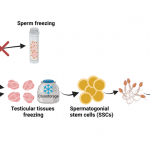To show support of the Allegheny County Board of Health’s vote on whether to mandate the human papillomavirus (HPV) vaccine, UPMC oncologists this week held a press briefing to share facts about the lifesaving vaccine. UPMC’s experts explained the importance of vaccinating children to protect against HPV-related cancers, including cervical, oropharyngeal and cancers of other reproductive organs.
The vaccine is proven to be safe and effective in preventing cancer, yet 79 percent of boys and girls in the Pittsburgh area are not vaccinated.
About the vaccine:
- The HPV vaccine can prevent HPV-related cancers.
- The American Academy of Pediatrics, the American Academy of Family Physicians, the CDC and other trusted organizations recommend that boys and girls get the HPV vaccine at ages 11-12 because the vaccine produces the most infection-fighting cells at this age.
- Each year in the United States, about 33,000 new cases of cancer are found in parts of the body where HPV is often found. HPV causes about 26,800 of these cancers.
- Choosing not to vaccinate is not a risk-free choice — HPV vaccines prevent serious cancers in both males and females.
- In recent years, UPMC physicians have recorded a 500 percent increase of patients who have cancer in the back of their throats combined with HPV infection.
- The Centers for Disease Control and Prevention has carefully studied the risks and benefits of HPV vaccination. HPV vaccination is recommended because the benefits, such as prevention of cancer and transmission of the virus, far outweigh the risks of possible side effects.
The best time to be vaccinated is before any exposure to the virus. The vaccine is most effective in school-aged children, but ages to get vaccinated range from 11 to 26 for women and 11 to 21 for men, according to Nancy Davidson, M.D., director of the UPMC Cancer Institute. Symptoms for HPV are minor to none.
“There is not much discomfort so it is hard to detect,” said Jonas Johnson, MD, chair of the Department of Otolaryngology. “Most patients will notice a lump on their neck.”
Patrick Maloney, a patient who was treated for cancer on his tonsils linked to the HPV virus, said the worst symptom he experienced was a cough. Mr. Maloney is cancer-free as of six months ago. After three chemotherapy treatments and 35 radiation treatments, he still experiences the side effects of treatment.
“I still suffer from dry mouth, loss of taste, and many things just aren’t the same anymore,” said Mr. Maloney. “I was unable to continue working as a mechanic, and I can’t do many activities I could do before my diagnosis because of loss of strength and mobility.”
To learn more about the HPV vaccine, click here. Dr. Steve Wilson, a pathologist in Indiana County, Pennsylvania, recently discussed how he discovered his human papillomavirus-linked throat cancer. To learn more of his story, click here.







